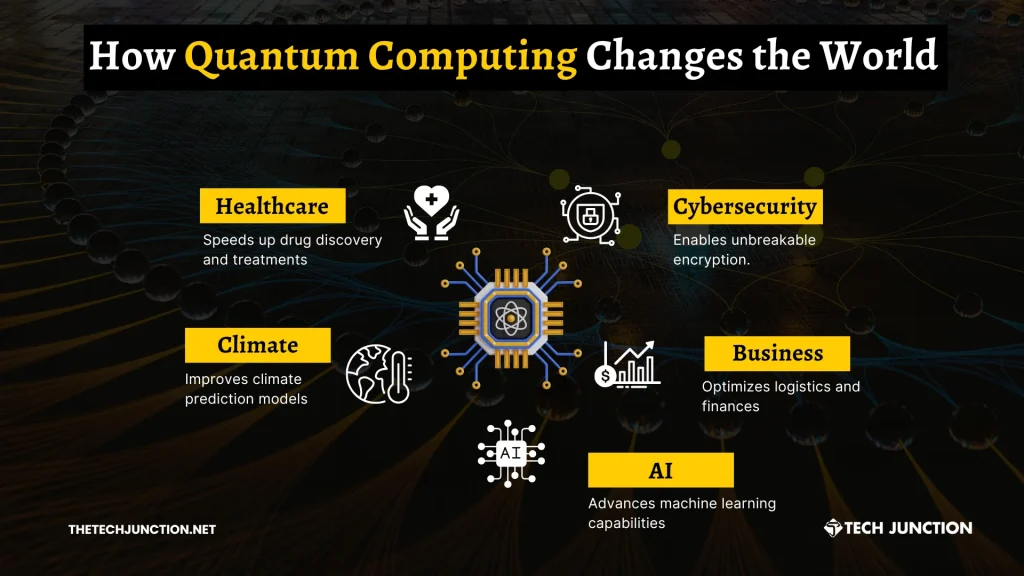The fast pace of technological advancement has brought us to a new era. Quantum computing was once a futuristic concept confined to science fiction but now it is a transformative reality. Quantum computers always operate on principles of quantum mechanics and open doors to solving complex problems. The future of quantum computing promises breakthroughs in fields like medicine, finance, cybersecurity and environmental science.
We’ll explore the current progress, real world applications and the profound impact quantum computing could have on the future.
What is Quantum Computing?
Traditional computers process information in bits represented as either 0 or 1. Quantum computers use bits or qubits that can represent 0 and 1 simultaneously. It allows quantum computers to perform difficult calculations much faster than classical computers.
Another key principle of quantum entanglement enables qubits to be interconnected, drastically enhancing computational power. The benefits of quantum computing are that it solves problems that would take traditional computers centuries to process in mere seconds.
Current Progress in Quantum Computing
Major tech companies are racing to develop practical quantum computers. Companies working on quantum computing like IBM, Google and Microsoft have made strides in this technology.
China has also emerged as a leader in quantum research with several breakthroughs in quantum communication and satellites. Governments worldwide invest billions in quantum research programs to maintain a competitive edge in this emerging field. Many challenges such as error rates and qubit stability must be addressed before quantum computers become mainstream.
Related Article:
Cloud Computing: The Backbone of Modern Business Operations
How Does Quantum Computing Change the World
The future of quantum computing lies in its wide range of applications. Here are some key areas where it is poised to make a impact.

1. Healthcare and Drug Discovery
One of the most important uses of quantum computing is in healthcare. Traditional drug discovery involves years of research and billions of dollars.
Quantum computers can model molecular interactions at an atomic level, drastically reducing the time and cost required for developing new drugs. It could lead to breakthroughs in treatments for diseases like cancer and Alzheimer’s.
2. Cryptography and Cyber Security
Quantum computing produce both opportunities and threats to cybersecurity. Governments and tech firms are investing in quantum safe cryptography to prepare for this new era.
Quantum key distribution (QKD) is one such advancement that promises unbreakable encryption by leveraging the principles of quantum mechanics.
3. Climate Modeling and Sustainability
Climate change is the biggest challenges facing by humanity. Quantum computers can process big amounts of data and create highly accurate climate models helping scientists predict changes and develop solutions to mitigate the impact of global warming.
4. Optimization Problems in Business
Businesses face numerous optimization challenges from supply chain logistics to financial portfolio management. Quantum computing can find optimal solutions faster than traditional methods which leads to cost savings and efficiency improvements.
5. Artificial Intelligence and Machine Learning
The future of artificial intelligence could be supercharged by quantum computing. Quantum algorithms can handle huge datasets and complex computations more efficiently accelerating AI model development and enhancing machine learning capabilities.
Quantum machine learning (QML) is an emerging field that combines quantum computing with traditional machine learning techniques. QML can revolutionize natural language processing, image recognition and autonomous systems.
Other Applications of Quantum Computing
1. The Role of Quantum Computing in Scientific Research
The quantum computer future is expected to be pivotal in scientific research. Fields such as materials science, quantum chemistry and fundamental physics stand to benefit immensely from quantum simulations.
Researchers can simulate the behavior of complex molecules design new materials with unique properties and gain deeper insights into the fundamental nature of the universe.
2. Quantum Computing and Financial Modeling
The financial sector stands to gain from quantum computing trends. Complex financial models, including risk assessment, derivatives pricing and portfolio optimization.
Quantum computer capabilities can process these models more efficiently providing faster insights and enabling more informed decision making.
3. Quantum Communication: The Future of Secure Networks
Quantum communication is driven by advances in quantum computing trends and promises secure communication channels. Quantum networks leverage the principles of quantum entanglement and superposition to create communication systems immune to eavesdropping.
In the quantum technology future we may see the deployment of a quantum internet. Such networks could revolutionize fields that rely on secure communication including government, military and financial services.
4. Quantum Computing in the Energy Sector
The quantum computing 2024 can benefit the energy sector in several ways. For instance quantum computers can optimize power grids by analyzing different amounts of data on energy consumption and distribution.
It can lead to more energy use and reduced operational costs. Additionally, quantum simulations can help develop advanced materials for energy storage, such as better batteries and superconductors, which are essential for the future of renewable energy.
Challenges on the Road Ahead
While the potential of quantum computing progress is immense, several hurdles remain. These include:
- Qubit stability: Quantum bits are highly sensitive to their environment, making it difficult to maintain their state for long periods.
- Error correction: Quantum computers are prone to errors due to decoherence.
- Scalability: Building quantum computers with thousands of qubits is a significant engineering challenge.
- Cost: Quantum computers require highly controlled environments and specialized equipment, which makes them expensive to develop and maintain.
Final Verdict
The future of quantum computing holds the potential to revolutionize various aspects of our lives. From transforming industries to solving complex global problems, quantum technology is poised to change the world as we know it.
As we continue to advance in this field, businesses, governments, and individuals must prepare for the quantum revolution. In the near future, we may witness the integration of quantum computing with other technologies like artificial intelligence, blockchain (crypto), and the Internet of Things (IoT), leading to unprecedented innovations.
FAQs
1. What is quantum computing in simple terms?
The quantum computing is a type of computing that uses bits or qubits which can represent both 0 and 1 simultaneously.
2. What industries will benefit the most from quantum computing?
Industries such as healthcare, finance, logistics, cybersecurity, energy and scientific research are expected to benefit significantly from quantum computing.
3. What are the current challenges in quantum computing?
Key challenges include qubit stability, error correction, scalability and high development costs.
4. When will quantum computers become mainstream?
Experts predict that practical large scale quantum computers could become mainstream within the next 10 to 20 years.
5. How is quantum computing used in cybersecurity?
Quantum computing can enhance encryption methods and improve secure communication through quantum key distribution (QKD).
6. What is quantum supremacy?
The quantum supremacy refers to the point at which a quantum computer can perform a task that is beyond the capabilities of even the most powerful classical supercomputers.
7. How can businesses prepare for the quantum future?
Businesses can prepare by staying informed about quantum advancements, investing in quantum literacy, and exploring partnerships with quantum research institutions or technology providers.
8. Are there any risks associated with quantum computing?
Yes quantum computing poses risks particularly in cybersecurity as it could break current encryption methods.
The Tech Junction is the ultimate hub for all things technology. Whether you’re a tech enthusiast or simply curious about the ever-evolving world of technology, this is your go-to portal.















